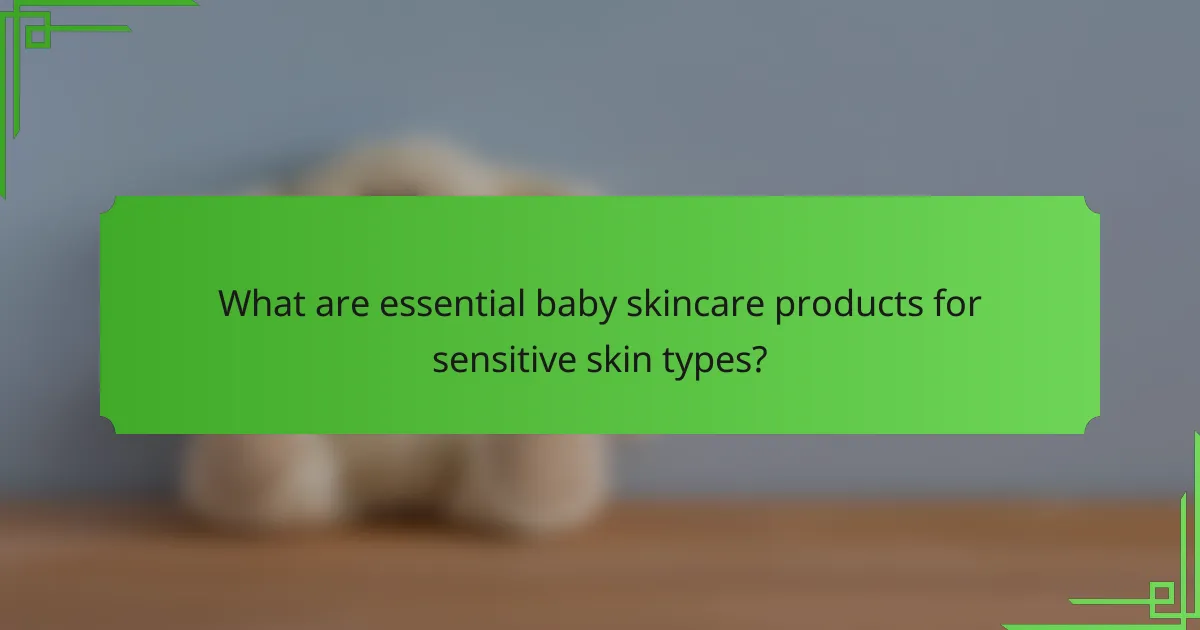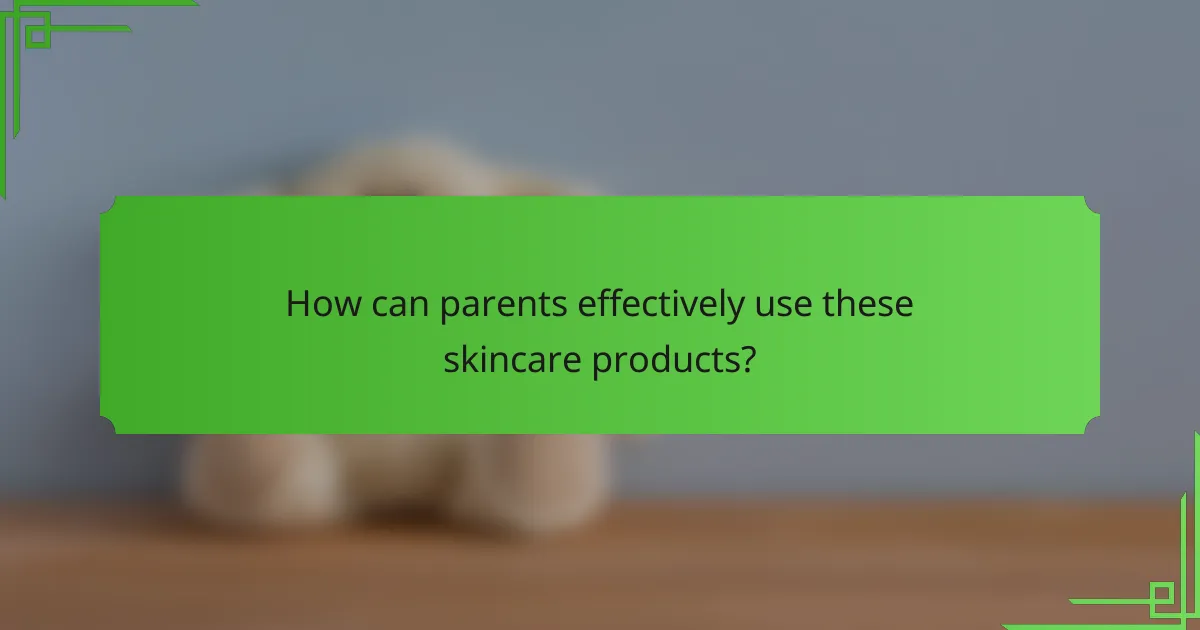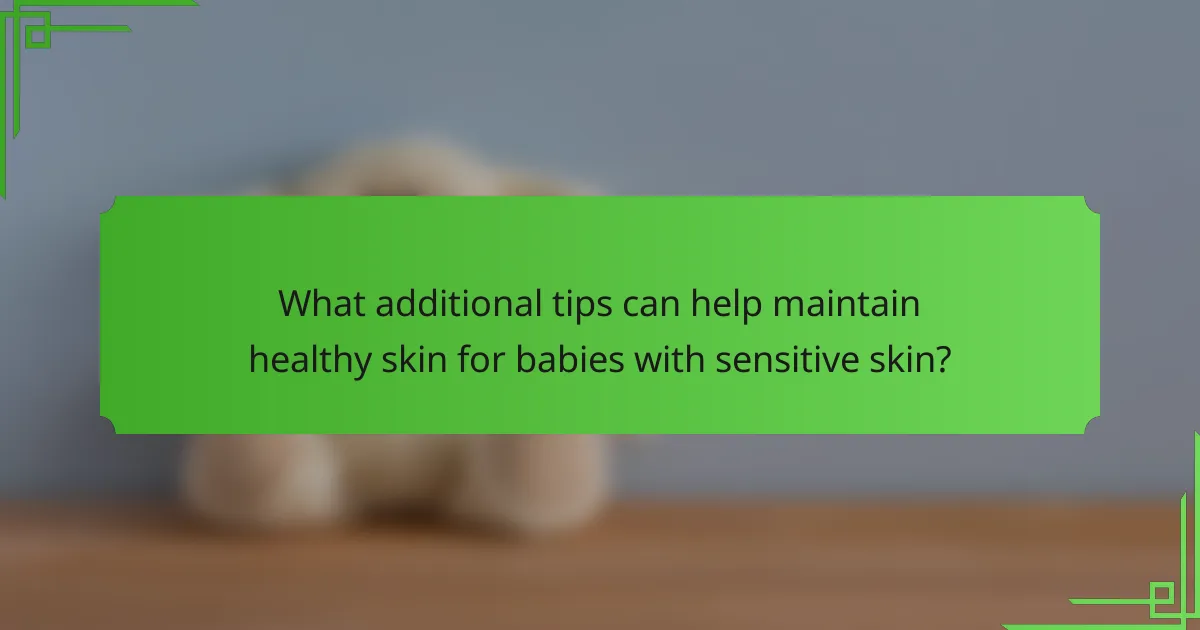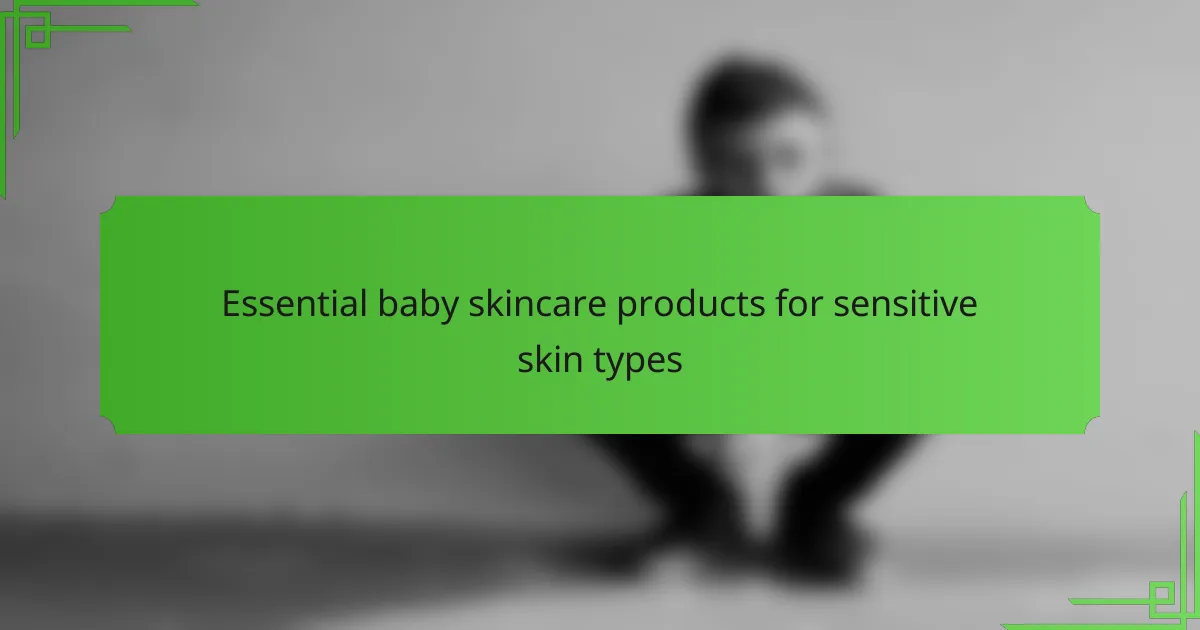Essential baby skincare products for sensitive skin types include gentle cleansers, moisturizers, and barrier creams, all designed to protect and nourish delicate skin. Gentle cleansers effectively remove dirt while preserving natural oils, and should be hypoallergenic and fragrance-free. Moisturizers containing soothing ingredients like aloe vera or shea butter hydrate and safeguard sensitive skin, while barrier creams help prevent diaper rash and irritation. A consistent skincare routine, featuring these products and proper bathing techniques, is crucial for maintaining skin health in infants with sensitive skin. Regular consultation with a pediatric dermatologist can provide tailored advice for effective skincare.

What are essential baby skincare products for sensitive skin types?
Essential baby skincare products for sensitive skin types include gentle cleansers, moisturizers, and barrier creams. Gentle cleansers help remove dirt without stripping natural oils. Look for products labeled as hypoallergenic and fragrance-free. Moisturizers should contain soothing ingredients like aloe vera or shea butter. These ingredients hydrate and protect sensitive skin. Barrier creams create a protective layer against irritants. They are crucial for preventing diaper rash and other skin issues. Pediatricians often recommend these products for infants with sensitive skin.
How do these products differ from regular baby skincare products?
Essential baby skincare products for sensitive skin types differ from regular baby skincare products in their formulation. These specialized products often contain fewer irritants and allergens. They are designed to be hypoallergenic, minimizing the risk of allergic reactions. Regular baby skincare products may include fragrances and preservatives that can irritate sensitive skin. Essential products often use natural ingredients known for their soothing properties. For example, they may incorporate oatmeal or calendula, which are gentle on the skin. Additionally, essential products are typically free from parabens and sulfates. This makes them safer for babies with delicate skin. Studies show that sensitive skin is more prone to irritation, highlighting the need for specialized formulations.
What ingredients should be avoided in baby skincare for sensitive skin?
Fragrance, parabens, sulfates, and alcohol should be avoided in baby skincare for sensitive skin. Fragrance can cause irritation and allergic reactions. Parabens are preservatives linked to hormonal disruptions. Sulfates may strip natural oils, leading to dryness. Alcohol can be harsh and drying on delicate skin. These ingredients are commonly found in many products but can exacerbate sensitivity. Choosing products without these ingredients helps protect a baby’s sensitive skin.
What are the key features of effective skincare products for sensitive skin?
Effective skincare products for sensitive skin should have gentle formulations. They must be free from harsh chemicals and fragrances. Hypoallergenic properties are essential to minimize allergic reactions. Soothing ingredients like aloe vera and chamomile help calm irritation. Non-comedogenic properties prevent clogged pores and breakouts. Moisturizing agents such as glycerin and ceramides maintain skin hydration. pH-balanced formulations ensure compatibility with the skin’s natural barrier. Dermatologist-tested products provide additional assurance of safety for sensitive skin types.
Why is it important to choose the right skincare products for babies with sensitive skin?
Choosing the right skincare products for babies with sensitive skin is crucial to prevent irritation and allergic reactions. Babies have delicate skin that is thinner and more permeable than [censured] skin. This makes them more susceptible to harmful ingredients commonly found in many skincare products. Using gentle, hypoallergenic products helps maintain the skin’s natural barrier. Products free from fragrances, dyes, and harsh chemicals reduce the risk of rashes and discomfort. Studies show that improper skincare can lead to conditions like eczema and dermatitis in sensitive infants. Therefore, selecting appropriate products is essential for their overall skin health and comfort.
How can improper skincare affect a baby’s sensitive skin?
Improper skincare can lead to irritation and rashes on a baby’s sensitive skin. Babies have thinner skin, making it more vulnerable to allergens and irritants. Common issues include dryness, redness, and inflammation. Using harsh soaps or lotions can strip natural oils, exacerbating dryness. Inadequate moisturizing can result in a compromised skin barrier. This may lead to increased susceptibility to infections. Research indicates that 50% of infants experience some form of dermatitis due to improper skincare. Therefore, choosing gentle, hypoallergenic products is crucial for maintaining healthy skin.
What signs indicate that a baby has sensitive skin?
Signs that indicate a baby has sensitive skin include redness, dryness, and irritation. Redness often appears on cheeks, arms, or legs after exposure to irritants. Dryness may lead to rough patches or flakiness on the skin. Irritation can manifest as rashes or bumps, especially after using certain products. Other signs include excessive crying or fussiness during bath time or after applying lotions. Babies with sensitive skin may also develop allergic reactions to fabrics or detergents. These symptoms suggest a need for gentle skincare products tailored for sensitive skin types.
What are the top recommended essential baby skincare products for sensitive skin types?
The top recommended essential baby skincare products for sensitive skin types include gentle cleansers, moisturizing creams, and balms. Gentle cleansers like fragrance-free baby wash help avoid irritation. Moisturizing creams with ingredients like shea butter and aloe vera provide hydration without harsh additives. Balms, such as those containing calendula, soothe sensitive areas effectively. Brands like Aveeno, Cetaphil, and Aquaphor are frequently recommended by pediatricians for their mild formulations. These products are often tested for safety and efficacy on sensitive skin.
What are the best moisturizers for babies with sensitive skin?
The best moisturizers for babies with sensitive skin include products with gentle, hypoallergenic formulas. Options like Aquaphor Healing Ointment are known for their soothing properties. Cetaphil Baby Daily Lotion is also recommended for its moisturizing effects without harsh ingredients. Another option is Eucerin Baby Body Lotion, which is fragrance-free and designed for sensitive skin. These products often contain ingredients like glycerin and shea butter that help retain moisture. Pediatricians often endorse these brands for their effectiveness and safety. Always check for certifications that indicate the product is suitable for sensitive skin.
Which cleansers are safe and effective for sensitive baby skin?
Gentle cleansers that are safe and effective for sensitive baby skin include those free from harsh chemicals and fragrances. Brands like Cetaphil Baby and Aveeno Baby offer formulations specifically designed for delicate skin. These cleansers contain soothing ingredients like aloe vera and chamomile. Clinical studies indicate that such ingredients help reduce irritation and maintain skin hydration. Pediatric dermatologists often recommend these products for infants with sensitive skin. Always check for hypoallergenic labels to ensure safety.
What protective products should be included in a baby’s skincare routine?
A baby’s skincare routine should include a gentle sunscreen, a moisturizing cream, and a barrier cream. Sunscreen protects against harmful UV rays. It is essential to choose a formula suitable for sensitive skin. Moisturizing cream hydrates the skin and prevents dryness. Look for products with natural ingredients and no harsh chemicals. Barrier cream protects against irritants and moisture loss. These products help maintain skin health and prevent rashes. Using these protective products can lead to healthier skin for babies.

How can parents effectively use these skincare products?
Parents can effectively use these skincare products by following a consistent routine. Start by selecting products specifically designed for sensitive skin. Apply a small amount to a patch of skin to test for reactions. Clean the baby’s skin gently before application. Use the products as directed, typically after bath time. Moisturizers should be applied while the skin is still damp. Reapply as needed, especially in dry conditions. Regular use can help maintain skin hydration and barrier function. Studies show that consistent application of appropriate skincare can reduce irritation and dryness in babies with sensitive skin.
What are the best practices for applying baby skincare products?
The best practices for applying baby skincare products include using gentle, fragrance-free formulations. Always perform a patch test on a small area of the baby’s skin before full application. Apply products immediately after bathing to lock in moisture. Use a small amount of product to avoid overwhelming the skin. Gently massage the product into the skin using soft, circular motions. Avoid applying products to broken or irritated skin. Choose products specifically designed for babies to ensure safety and compatibility. Regularly check for any signs of irritation or allergic reactions after application.
How often should skincare products be applied to sensitive skin?
Skincare products should be applied to sensitive skin twice daily. This frequency helps maintain hydration and protect the skin barrier. Morning application prepares the skin for environmental stressors. Evening application aids in overnight repair. Dermatologists recommend gentle formulations to avoid irritation. Products should be introduced gradually to monitor reactions. Consistency is key for optimal results in sensitive skin care.
What techniques can help soothe irritated skin during application?
Apply a cold compress to soothe irritated skin during application. Cold temperatures can reduce inflammation and redness. Use a clean cloth soaked in cold water. Place it gently on the affected area for a few minutes. This technique is effective in calming irritation. Additionally, using fragrance-free moisturizers can help. They provide hydration without causing further irritation. Choose products with soothing ingredients like aloe vera or chamomile. These components are known for their calming properties. Always perform a patch test before full application to ensure no adverse reactions occur.
What should parents watch for when using new skincare products?
Parents should watch for allergic reactions when using new skincare products. Signs of allergic reactions include redness, swelling, or rash on the skin. Parents should also check for irritation after applying the product. If a child shows discomfort or unusual reactions, discontinue use immediately. Ingredients should be reviewed for common allergens like fragrances or preservatives. Patch testing on a small area can help determine tolerance. It’s important to choose products specifically formulated for sensitive skin. Consulting a pediatric dermatologist can provide tailored advice.
How can parents identify allergic reactions or irritations?
Parents can identify allergic reactions or irritations by observing specific symptoms. Common signs include redness, swelling, or rashes on the skin. Itching or discomfort may also indicate an allergic response. Parents should monitor for hives or blisters, which are often associated with allergies. Additionally, gastrointestinal symptoms like vomiting or diarrhea can occur in some cases. Noting the timing of symptoms after exposure to new products or foods is crucial. Keeping a diary of reactions can help identify triggers. Consulting a pediatrician for persistent or severe reactions is recommended for accurate diagnosis and management.
What steps should be taken if a reaction occurs?
Stop using the product immediately if a reaction occurs. Identify the symptoms, such as redness, swelling, or rash. Clean the affected area gently with lukewarm water. Apply a cold compress to soothe irritation. Monitor the baby for worsening symptoms. Consult a pediatrician for further advice if symptoms persist. Document the reaction for future reference. This approach ensures prompt care and helps prevent further irritation.

What additional tips can help maintain healthy skin for babies with sensitive skin?
Use gentle, fragrance-free products to avoid irritation on babies with sensitive skin. Opt for hypoallergenic moisturizers to keep skin hydrated. Bathe the baby in lukewarm water, as hot water can strip natural oils. Limit bath time to 5-10 minutes to prevent dryness. Dress the baby in soft, breathable fabrics like cotton. Change diapers frequently to reduce moisture buildup. Keep the baby’s environment humidified to prevent skin from drying out. Regularly consult a pediatric dermatologist for personalized skincare advice.
How can lifestyle choices impact a baby’s skin health?
Lifestyle choices significantly impact a baby’s skin health. Factors such as diet, exposure to allergens, and hygiene practices play crucial roles. A balanced diet rich in vitamins and minerals supports skin development and repair. Exposure to allergens, like certain fabrics or detergents, can lead to irritation or rashes. Proper hygiene, including regular bathing with gentle products, helps maintain skin barrier function. Additionally, environmental factors like humidity and temperature affect skin hydration levels. Research shows that babies exposed to harsh chemicals or pollutants may develop skin conditions like eczema. Therefore, mindful lifestyle choices can promote healthier skin in infants.
What role does diet play in skin sensitivity?
Diet significantly influences skin sensitivity. Certain foods can trigger allergic reactions or irritate the skin. For instance, dairy and gluten are common culprits for some individuals. Processed foods high in sugars and additives may exacerbate inflammation. Antioxidant-rich foods like fruits and vegetables support skin health. Omega-3 fatty acids found in fish can improve skin barrier function. Hydration from water and herbal teas is essential for maintaining skin moisture. Studies show that an anti-inflammatory diet can reduce skin sensitivity symptoms.
How can environmental factors affect sensitive skin?
Environmental factors can significantly affect sensitive skin. Changes in temperature can lead to dryness or irritation. Pollution can cause inflammation and exacerbate skin conditions. Humidity levels can either hydrate or dry out the skin. Sun exposure can increase sensitivity and lead to sunburn. Harsh winds can strip moisture from the skin’s surface. Allergens, such as pollen, can trigger reactions in sensitive skin. These factors can compromise the skin barrier, making it more vulnerable to irritation and discomfort.
What are some common misconceptions about baby skincare for sensitive skin?
One common misconception about baby skincare for sensitive skin is that all products labeled as “natural” are safe. Many natural ingredients can still cause irritation. Another misconception is that fragrance-free products are always gentle. Some fragrance-free products contain harsh preservatives that can irritate sensitive skin. Additionally, many believe that baby skin does not require moisturizing. However, pediatric dermatologists recommend moisturizing to maintain the skin barrier. Lastly, some parents think that more frequent bathing is better for hygiene. In reality, excessive bathing can strip natural oils and worsen sensitivity.
Why is it a myth that all natural products are safe for sensitive skin?
It is a myth that all natural products are safe for sensitive skin because natural ingredients can still cause allergic reactions. Many natural substances, such as essential oils and plant extracts, contain compounds that may irritate the skin. For example, lavender oil can cause contact dermatitis in some individuals. Additionally, the term “natural” does not guarantee purity or safety. Contaminants or additives can be present in natural products. A study published in the Journal of Dermatological Science found that some natural ingredients can trigger adverse reactions in sensitive skin types. Therefore, caution is necessary when using natural products on sensitive skin.
What should parents know about fragrance-free products?
Parents should know that fragrance-free products are formulated without added scents. These products reduce the risk of skin irritation and allergic reactions. Many babies have sensitive skin that can react negatively to fragrances. Dermatologists often recommend fragrance-free options for infants. According to the American Academy of Dermatology, fragrance is a common allergen. Choosing fragrance-free products can help maintain skin health. Parents should always check labels for fragrance-free claims. This ensures that the products are safe for their baby’s delicate skin.
What are the best practices for choosing and using essential baby skincare products?
Choose baby skincare products that are specifically formulated for sensitive skin. Look for products labeled as hypoallergenic and free from fragrances, dyes, and harsh chemicals. Ingredients like aloe vera and chamomile are gentle and soothing. Always perform a patch test before full application to check for reactions. Use a small amount of product to avoid overwhelming the skin. Apply products after bathing to lock in moisture. Regularly check expiration dates to ensure product effectiveness. Consult with a pediatrician for personalized recommendations based on your baby’s skin type.
Essential baby skincare products for sensitive skin types are specially formulated to address the unique needs of infants with delicate skin. This article outlines the key attributes of these products, including gentle cleansers, moisturizers, and barrier creams, emphasizing the importance of hypoallergenic and fragrance-free formulations. It also highlights ingredients to avoid, such as parabens and sulfates, and discusses best practices for application and usage. Additionally, the article provides insights into how lifestyle choices and environmental factors can impact a baby’s skin health, along with common misconceptions surrounding baby skincare.
